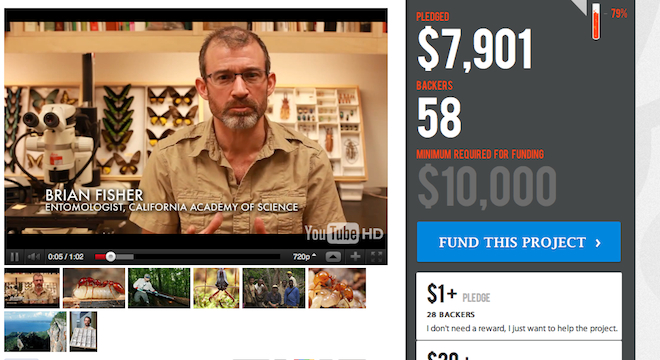There’s a brand new crowd funding website in town, and its name is Petridish.org. Like Kickstarter, it allows aspiring project creators to pitch their ideas in the form of video and text to the open Web, offering promotional material in exchange for donations. Like Kickstarter, Petridish takes a 5 percent cut of all successfully funded projects for operating expenses and leaves the rest to the project creators to use to turn their ideas into reality.
But Petridish.org, which launched in beta on Tuesday, March 6, differs from the better-known Kickstarter in a significant way: Petridish is dedicated wholly to one category of projects — scientific research.
Crowdsourcing and scientific research are a “really natural fit,” according to Petridish’s co-founder Matt Salzberg, a venture capitalist at Bessemer Venture Partners in New York City. Salzberg spoke to TPM about his project in a phone interview.
“I’ve seen firsthand the power of internet to bring together many small contributions to make a major impact,” Salzberg said, citing Kickstarter, micro-finance-like website Kiva.org, and even daily deals website Groupon, which leverages its millions of users with merchants to secure discounts.
“I thought, ‘we can and should bring that power to science funding,'” Salzberg added.
But Salzberg said he noticed a deficiency in the ability of science projects to break out on the mushrooming crop of crowd funding platforms, many of which are focused on art, technology or other more niche industries. (Although it is worth noting that some scientists have had success using Petridish’s predecessors — The New York Times in July 2011 profiled several scientists who had turned to Kickstarter and its ilk to fund their relatively modest research goals).
As such, Salzberg moved quickly to create Petridish, working from the initial concept in December 2011 to the first public beta in March 2012.
“Nobody was really doing it right,” Salzberg told TPM. But he thinks his web startup, which he co-founded with software engineer Ilia Papas (now Petridish’s CTO), can help fix that.
“We’re trying to build a community based on people who like and love science research,” Salzberg said.
To accomplish that, Petridish’s initial priority is sorting through the “hundreds” of project submissions that have so far poured into the young website and finding those that are viable. And those projects haven’t just come from smaller, cash-strapped universities.
Salzberg, a Harvard Business School graduate, pointed out that Harvard and Stanford accredited researchers were already featured among the first nine projects on the website, and said that he had submissions from Yale to sort through as well, in addition to many schools outside of the Ivy League.
One project, a proposed expedition by California Academy of Sciences conservationist Brian Fisher that seeks to discover a new species of ants in Madagascar before their habitat is destroyed, is already 79 percent towards its goal of $10,000 in funding with 26 days left to go.
For now, Petridish only accepts submissions under $25,000, far less than the multi-million dollar projects that have popped up on Kickstarter lately. But Petridish also pours funding back into projects itself, 5 percent of every user’s donation if that user shares a link to the project on Facebook or Twitter.
Salzberg said he’s trying to attain the perfect balance between promoting gee-whiz science and important research for the betterment of all humanity.
“We try to pick projects that we think will be interesting to the public,” Salzberg told TPM, “We’re not not trying to tell people whether these are best projects or not, we’re just doing curation to make sure all the projects are interesting and legitimate.”
Indeed, Salzberg said that his website took pains to ensure that no “obvious frauds,” would be given space to fundraise. This is accomplished by checking the scientist applicants’ credentials to ensure they are working with reputable institutions and have no red flags.
Salzberg acknowledged he doesn’t have a scientific background, but said this was part of the point of his website, allowing the public to support research based on the researchers’ pitches and every user’s individual interests and concerns.
Eventually, Salzberg intends to build a peer-reviewing functionality into Petridish’s website itself, but thats still a long way off.
For now, the website is just attempting to start a new way for the public and scientists to connect and fund projects that might not get attention from existing funding streams due to the decreasing sources of money, increasing restrictions on funding and political concerns, both within institutions and outside of them.
“Scientists are fundamentally entrepreneurial people,” Salzberg said. “They’re out there doing this stuff on their own, securing grant funding, devising their projects from the ground up…We can contribue a lot to helping getting their early stage projects off the ground, or projects in areas outside of established research.”
As for the donators themselves, Salzberg said his website wouldn’t be doing any screening.
“Anyone who wants to contribute to a project can contribute,” Salzberg said. “You just click ‘Fund this Project.’ In that sense, we’re like every other donations site.”






